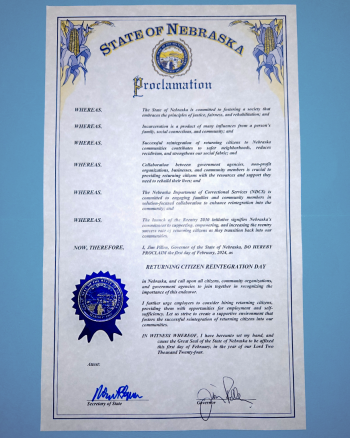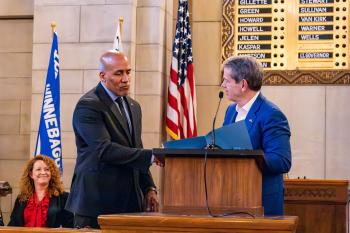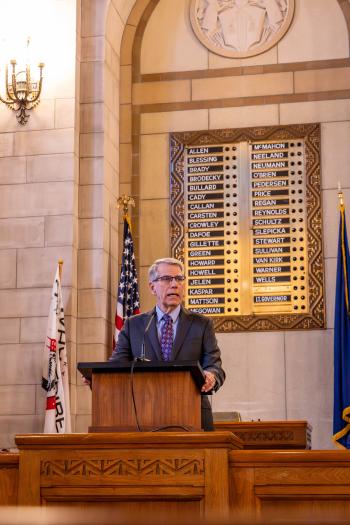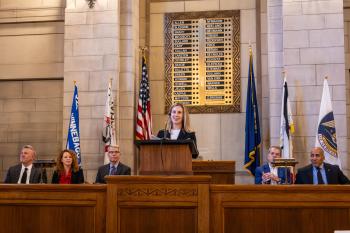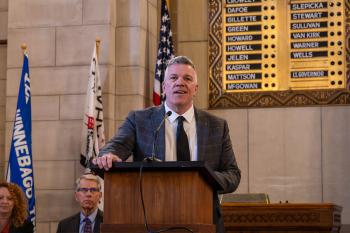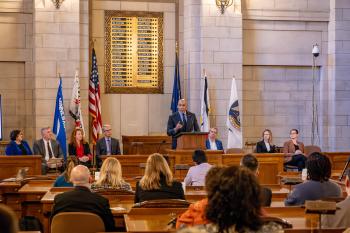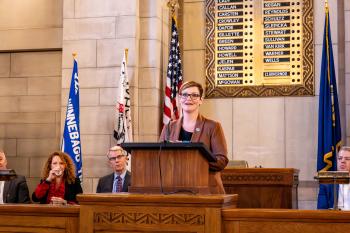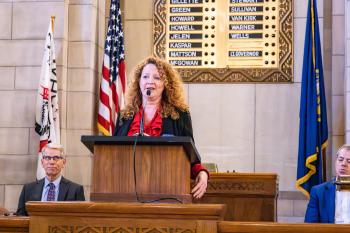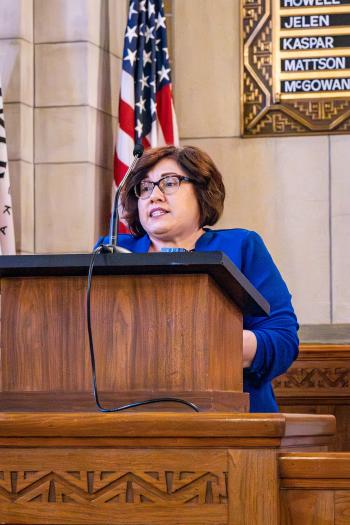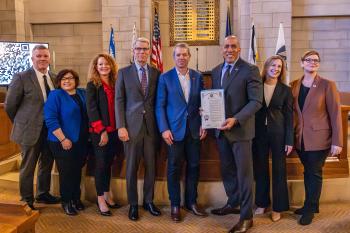Nebraska introduces national reentry partnership
Nebraska introduces national reentry partnership
FOR IMMEDIATE RELEASE (24-06)
CONTACT Caralea Strayer, Communications Manager
OFFICE 402-479-5941 | caralea.strayer@nebraska.gov
Nebraska introduces national reentry partnership
February 1, 2024 (Lincoln, Neb.) – Nebraska has become the fourth state in the nation to launch Reentry 2030, a national initiative uniting leaders across the country — at the state and local levels and across justice, workforce, health, and housing sectors — to improve reentry success for people with criminal records.
“Launching Reentry 2030 in Nebraska confirms our commitment to rehabilitation and second chances,” said Governor Jim Pillen. “By setting bold goals, fostering collaboration, and embracing innovation, we aim to build a state where every individual, regardless of past challenges, can reintegrate with safety, intentionality, and purpose. Nebraska leads the way in redefining success, ensuring the well-being of families and communities—the Nebraska Way.”
Reentry 2030 is led by The Council of State Governments (CSG) Justice Center, Correctional Leaders Association, and JustLeadershipUSA, in partnership with the U.S. Department of Justice’s Bureau of Justice Assistance under the Second Chance Act. As a participating state in Reentry 2030, Nebraska is committed to setting bold, meaningful, and transparent reentry goals and tracking its progress on outcomes to drive systemic changes.
“We are embarking on a transformative journey with a holistic approach to preparing individuals for reentry into society,” said Rob Jeffreys, director of the Nebraska Department of Correctional Services. “This initiative is about fostering growth, building bridges, and ensuring that every person leaving our facilities has a genuine opportunity for a positive reintegration into society.”
Nebraska’s goals are centered around reentry success, education, employment, collaboration and supportive resources. Currently, nearly 72 percent of the people who leave prison remain in the community. This initiative aims to increase that success rate to 82 percent by 2030. As the initiative develops, additional reentry goals will be added. Initial goals include:
- Promoting education, with a 30 percent increase in GED completion during incarceration, 15 percent increase in GED proctors, and 50 percent increase in college coursework enrollment;
- Expanding program participation, with a 50 percent increase in utilization of tablet programming and 25 percent increase in participation in Vocational and Life Skills programming;
- Ensuring 100 percent of eligible individuals who are incarcerated are enrolled in Medicaid;
- Assisting 100 percent of individuals who are incarcerated with obtaining state identification and birth certificates prior to release;
- Providing support so that at least 90 percent of individuals who are released will be gainfully employed within 30 days of parole placement; and
- Developing a systemic approach to reentry through the creation of a statewide Nebraska reentry council comprised of public, private, and service provider entities.
“Nebraska's commitment to Reentry 2030 reflects a significant step in our shared mission to reduce recidivism, remove barriers to reentry, and ensure that people returning to their communities have meaningful second chances," said Megan Quattlebaum, director of the CSG Justice Center. “We look forward to supporting state leaders with data-informed strategies and resources and to helping them realize their vision. I am confident that Reentry 2030 will drive positive change by fostering collaboration and connections, promoting individual success, and enhancing public safety throughout Nebraska.”
Through Reentry 2030, Nebraska will participate in a national network of states and receive tailored support to move forward and achieve its goals. “Our partnerships through the Vocational and Life Skills (VLS) program gives us a solid foundation upon which we will collaborate to reach our Reentry 2030 goals,” said Dawn-Renee Smith, deputy director – Rehabilitative Services Division. “Our work with Dr. Carrie Pettus of Wellness and Equity Innovations to implement the strengths-based 5-Key Model for Reentry and Well-Being Development is integral to our reentry preparation efforts. As we learn and grow through the networking opportunities, we hope to also share this program as a best practice for other states.”
###

